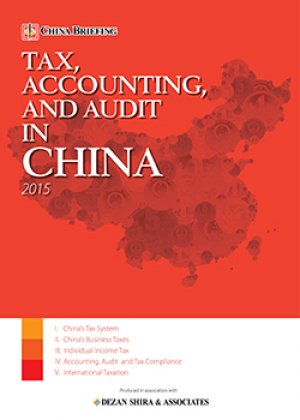Sending employees to China on a Project Basis? Avoid an Unexpected Tax Bill
 By Steven Elsinga and Grace Tate
By Steven Elsinga and Grace Tate
Apart from placing full time expatriate employees in China, as an investor you may often need to send staff from the parent company to China to complete temporary projects. Common examples include quality control, engineering projects, training or consultancy. However, what many foreign investors don’t know is that such visits may result in the parent company being subject to a wide array of Chinese taxes. This may even be the case if the company already has a subsidiary in China.
So how does this work? Obviously, a foreign-owned company incorporated in China is subject to Chinese tax. However, if a company registered abroad is deemed to have ‘permanent establishment’ in China, it will be subject to Chinese tax as well, such as Corporate Income Tax, VAT and other local surcharges. This would happen if the foreign enterprise has a business venue or construction site in China, is represented in China by an agent, or – most relevant to the topic at hand – dispatches personnel to China to provide services. This includes services rendered to the local subsidiary.
At this stage it is important to note that the determination of permanent establishment can be applied retroactively. If the Chinese tax authorities determine that a foreign company has had a permanent establishment in China for the past several years, the company may suddenly be faced with a large tax bill.
Triggering Permanent Establishment
In the absence of a tax treaty with the country where the foreign entity is registered, China’s Corporate Income Tax Law stipulates when a non-resident enterprise is subject to tax in China. This occurs when an entity that is registered abroad has an office or premises in China, or if not, it derives income from China. The income that is derived from China, or connected to the premises (where present) is subject to Chinese Corporate Income Tax.
However, these days most countries in the world have a double tax agreement (DTA) signed with China. The determination of permanent establishment under these treaties is more precise, but the details may differ per agreement.
![]() RELATED: Triggering Permanent Establishment Status in China
RELATED: Triggering Permanent Establishment Status in China
For example, when it comes to a Service Permanent Establishment (as distinct from Agent or Physical Premises) the US-China DTA states that a non-resident enterprise has a permanent establishment if it sends people to provide services in China for more than six months (cumulatively) within any period of twelve months. This standard is applied quite strictly: as soon as an individual from that company spends one day of the month in China, it is counted as one month. So, if the company had individuals on the ground in China for seven or more months within twelve months, it is considered to have permanent establishment.
Only when no individuals affiliated to the American company have been in China for six full months would there not be a permanent establishment.
However, most DTAs that China has with foreign countries apply a different standard. Instead, these treaties count the number of days the entity had people in China, with the crossover number usually being 183 days (within any period of twelve months).
If permanent establishment is determined under the DTA, the foreign entity will be liable for tax over the income earned in China, or income that is attributable to its presence in China.
Secondment
The matter becomes interesting when the foreign entity in fact has a subsidiary with staff in China, but sends its people on projects to China, either to work with the subsidiary or for projects of its own. In the case of secondment, the parent company typically continues to pay salary for the dispatched worker and reimburses these expenses from the local subsidiary. In instances where the Chinese subsidiary requests personnel to be sent over and directs their work, that would not establish permanent establishment. In that case, the Chinese tax authorities would just tax the Chinese subsidiary for the income that was generated from the dispatched employees’ presence.
![]() RELATED: China Moves to Curb Transfer Pricing – Effective Immediately
RELATED: China Moves to Curb Transfer Pricing – Effective Immediately
However, the Chinese tax authorities will likely say permanent establishment applies when the overseas parent:
- Manages the dispatches employees’ work
- Determines how many people are sent
- Bears the cost of the dispatched employee’s salary
- Obtains profit from the Chinese subsidiary for the assigned employees’ activities
If that happens, the overseas parent company will be subject to Chinese tax over the income generated in China.
Recommendations for HR teams
Short-term foreign assignments are characterized by time-sensitive decisions, which often coincide with a failure to proceed through HR channels. Bypassing HR can lead to triggering permanent establishment. While the triggering of permanent establishment is a tax matter, the HR department is in the best position to prevent this from happening. The human resources department ideally has the most information on what staff is sent on assignments where, and how long. It is often also able to make arrangements to ensure that the short term assignments are seen as part of the subsidiary’s activities – not of the parent company.
It would therefore be prudent for foreign enterprises to clearly define their processes and policies with regards to short-term assignments.
Foreign enterprises should establish internal policies in order to:
- Define assignment responsibilities to avoid too much control lying with the parent company
- Cost allocation of short term assignments between parent and subsidiary
- Document travel information to track time spent by dispatched employees in China
- Coordinate between the HR, finance and operational departments
The exponential rise in international mobility means that foreign enterprises can no longer afford to neglect properly planning short-term assignments. Especially in emerging markets such as China, the tax implications of short-term assignments have attracted increased attention from tax authorities.
|
Asia Briefing Ltd. is a subsidiary of Dezan Shira & Associates. Dezan Shira is a specialist foreign direct investment practice, providing corporate establishment, business advisory, tax advisory and compliance, accounting, payroll, due diligence and financial review services to multinationals investing in China, Hong Kong, India, Vietnam, Singapore and the rest of ASEAN. For further information, please email china@dezshira.com or visit www.dezshira.com. Stay up to date with the latest business and investment trends in Asia by subscribing to our complimentary update service featuring news, commentary and regulatory insight.
|
![]()
 Tax, Accounting, and Audit in China 2015
Tax, Accounting, and Audit in China 2015
This edition of Tax, Accounting, and Audit in China, updated for 2015, offers a comprehensive overview of the major taxes foreign investors are likely to encounter when establishing or operating a business in China, as well as other tax-relevant obligations. This concise, detailed, yet pragmatic guide is ideal for CFOs, compliance officers and heads of accounting who must navigate the complex tax and accounting landscape in China in order to effectively manage and strategically plan their China operations.
 Human Resources and Payroll in China 2015
Human Resources and Payroll in China 2015
This edition of Human Resources and Payroll in China, updated for 2015, provides a firm understanding of China’s laws and regulations related to human resources and payroll management – essential information for foreign investors looking to establish or already running a foreign-invested entity in China, local managers, and HR professionals needing to explain complex points of China’s labor policies.
 Employing Foreign Nationals in China
Employing Foreign Nationals in China
In this issue of China Briefing, we have set out to produce a guide to employing foreign nationals in China, from the initial step of applying for work visas, to more advanced subjects such as determining IIT liability and optimizing employee income packages for tax efficiency. Lastly, recognizing that few foreigners immigrate to China on a permanent basis, we provide an overview of methods for remitting RMB abroad.
- Previous Article Assouplissement de la Politique d’Immigration à Hong Kong
- Next Article Les Spécificités du Fonds de Logement en Chine













